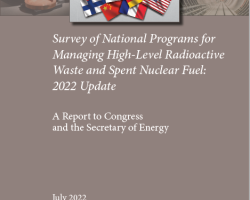Category of Content
Siting Experience Documents Only
Publication Date
Subject Matter
Environmental Justice Strategy
Environmental Justice Strategy
In November 2007, the U.S. Department of Energy (DOE or Department) re‐established its Environmental Justice (EJ) Task Force to review and update the 1995 Environmental Justice Strategy and develop an Environmental Justice Five‐Year Implementation Plan.
U.S. Department of Energy’s Equity Action Plan
U.S. Department of Energy’s Equity Action Plan
The Department of Energy (hereinafter DOE or the Department) is responsible for ensuring the Nation’s security and prosperity by addressing its energy, environmental and nuclear challenges through transformative science and technology solutions. DOE maintains the Nation’s nuclear weapons stockpile, reduces the threat of nuclear proliferation, oversees the Nation’s energy supply, leads the Nation in areas of federally sponsored basic research critical to U.S.
Policies for Achieving Energy Justice in Society: Best Practices for Applying Solar Energy Technologies to Low-Income Housing
Policies for Achieving Energy Justice in Society: Best Practices for Applying Solar Energy Technologies to Low-Income Housing
Studies indicate that the energy burden — energy costs as a percentage of annual family income — on low-income families is inordinately high, compared to that of the rest of the population. Rising fuel costs exacerbate this problem. Residential solar energy systems can help address this situation by furnishing a price-stable energy source with the added benefit of reduced greenhouse gas emissions. However, without appropriate incentives, these systems are prohibitively expensive for low-income families.
Response by the White House Council on Environmental Quality to the White House Environmental Justice Advisory Council’s Final Recommendations: Justice40, Climate and Economic Justice Screening Tool, and Executive Order 12898 Revisions...
Response by the White House Council on Environmental Quality to the White House Environmental Justice Advisory Council’s Final Recommendations: Justice40, Climate and Economic Justice Screening Tool, and Executive Order 12898 Revisions...
Introduction
A. The Biden-Harris Administration’s Commitment to Environmental Justice
Reset of America's Nuclear Waste Management Strategy and Policy
Reset of America's Nuclear Waste Management Strategy and Policy
The U.S. nuclear waste management program has labored for decades at a cost of billions of dollars each year, and yet there is still no active disposal program either for spent nuclear fuel from commercial reactors or for the high-level radioactive legacy waste and spent nuclear fuel from defense programs.
Final Recommendations: Justice40 Climate and Economic Justice Screening Tool & Executive Order 12898 Revisions
Final Recommendations: Justice40 Climate and Economic Justice Screening Tool & Executive Order 12898 Revisions
About the WHEJAC:
Survey of National Programs for Managing High-Level Radioactive Waste and Spent Nuclear Fuel: 2022 Update
Survey of National Programs for Managing High-Level Radioactive Waste and Spent Nuclear Fuel: 2022 Update
In October 2009, the U.S. Nuclear Waste Technical Review Board (Board or NWTRB) published Survey of National Programs for Managing High-Level Radioactive Waste and Spent Nuclear Fuel. For each of the 13 national programs studied, the report catalogued 15 institutional arrangements that had been set in place and 15 technical approaches that had been taken to design repository systems for the long-term management of high-activity radioactive waste.

